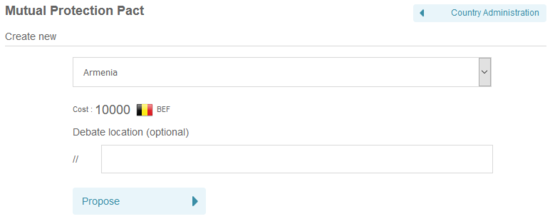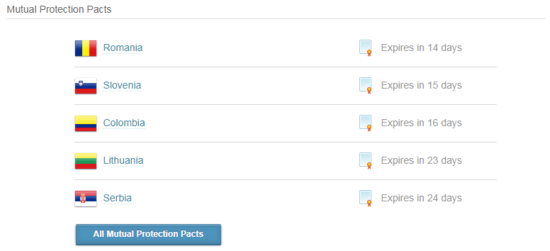Mutual protection pact
| Languages: | |||||||||||||||||||||||||||||||||||||||||||||||||||||||||||||||||
| |||||||||||||||||||||||||||||||||||||||||||||||||||||||||||||||||
| Laws that can be proposed by |
|---|
|
President: New citizen message · MPP · Declare war · Airstrike · Propose peace · Trade embargo · Resource concession · Leave alliance · Change alliance leader |
| A Mutual protection pact (MPP) (formerly known as an "alliance") is an offensive and defensive agreement between two countries. If a country in the pact attacks another non-pact country, or is attacked by another non-pact country, the other pact country automatically becomes an ally in the war.
If a country is an ally in the war, its citizens can fight for their ally from their homeland, as long as their country is deployed for the specific battle. |
How mutual protection pacts are made
Accessible from Main menu –> Community –> My country –> Administration.
Note: Signing an MPP will cost 10,000 local currency from both country treasuries. MPP expires after 30 days.
Mutual protection pacts are proposed as laws by the president of any given country. When a President proposes an MPP to Congress, 10,000 country currency is removed from the treasury of each country. The Congress members have to vote for or against the law in the two countries. If accepted by both Congresses, it is valid starting the day it was marked as accepted for 30 days. If not accepted by at least one of the two Congresses, the money will be returned to both country treasuries. Voting in both congresses is simultaneous.
Example: Hungary wants to sign a mutual protection pact with Serbia. In this case, ![]() 10,000 HUF is used from Hungarian treasury and
10,000 HUF is used from Hungarian treasury and ![]() 10,000 RSD from Serbian treasury.
10,000 RSD from Serbian treasury.
Note: You cannot propose a mutual protection pact to a country that doesn't have any regions at that time. However, a country that does not have any regions can propose mutual protection pacts to other countries.
MPPs can be proposed and voted for at any point before they expire.
After 30 days the MPP is disabled automatically. Before being disabled, the president can propose another mutual protection pact with the same country and, if approved by Congress, the end date is extended by another 30 days.
Friend of a friend cancellation
Although MPPs have given expiration times, they are automatically cancelled if a country attacks a country that shares a common MPP with it (known as the friend of a friend cancellation).
Example: If Sweden and Germany both have an MPP with Poland, and Sweden attacks Germany, the MPP between Sweden and Poland is cancelled.
When are the mutual protection pacts checked for common countries?
MPP cancellation is checked:
- at the beginning of the war (through either "declare war" law, "natural enemy" law or airstrike law);
- at the beginning of each campaign (through either an automatic attack or when the president clicks on the button).
You can sign MPPs any time you wish – before or during a war AND before or during a campaign. Their cancellation kicks in only when an event occurs (War or NE declaration, start of campaign, etc.).
Triggering mutual protection pacts
In any war, both the country that is being attacked and the country that declared the war may have allies through mutual protection pacts.
- MPPs are triggered on both sides when a country attacks any region of another country.
- Once triggered, they are by default active only as long as there is an active MPP between the countries or the war is closed.
- Triggered MPPs will support all future offensive actions in any region.
Deploying allied forces
Since Day 3579 (September 7, 2017), military leaders of a country are able to choose the allies they wish to deploy in battles. Only by deploying an army are its soldiers able to fight from their homeland, without the need to travel to the theater of war (as previously all the soldiers located in a country with a valid MPP were able to).
People who are able to set and update the deployed allies' list are: Country President, Dictator, Prime Minister, Minister of Defence and Minister of Foreign Affairs
As financing a military campaign is an expensive undertaking, only forces amounting up to 15% of the total military power of the world can be deployed for a battle and benefit from the fight from homeland advantage (the power of the country directly involved in the battle included). The military power of each country is based on its citizens’ performance during the previous weekly challenge.
Allied armies are deployed in the order decided by the military leaders. A deployment is valid for future battles (rounds) and will not affect the ongoing battles.
The deployment order can be changed at any time from the wars page, the battle console or the country’s military page and is valid for future battles (rounds).
See also
External links
![]() Back to Country administration page
Back to Country administration page
![]() Back to Military page
Back to Military page
| Wars |
|---|
|
Basics: Military tutorial • War • Declare war • Natural enemy • Airstrike • Battlefield • Battle • Battle priorities • Determination • Empire |


